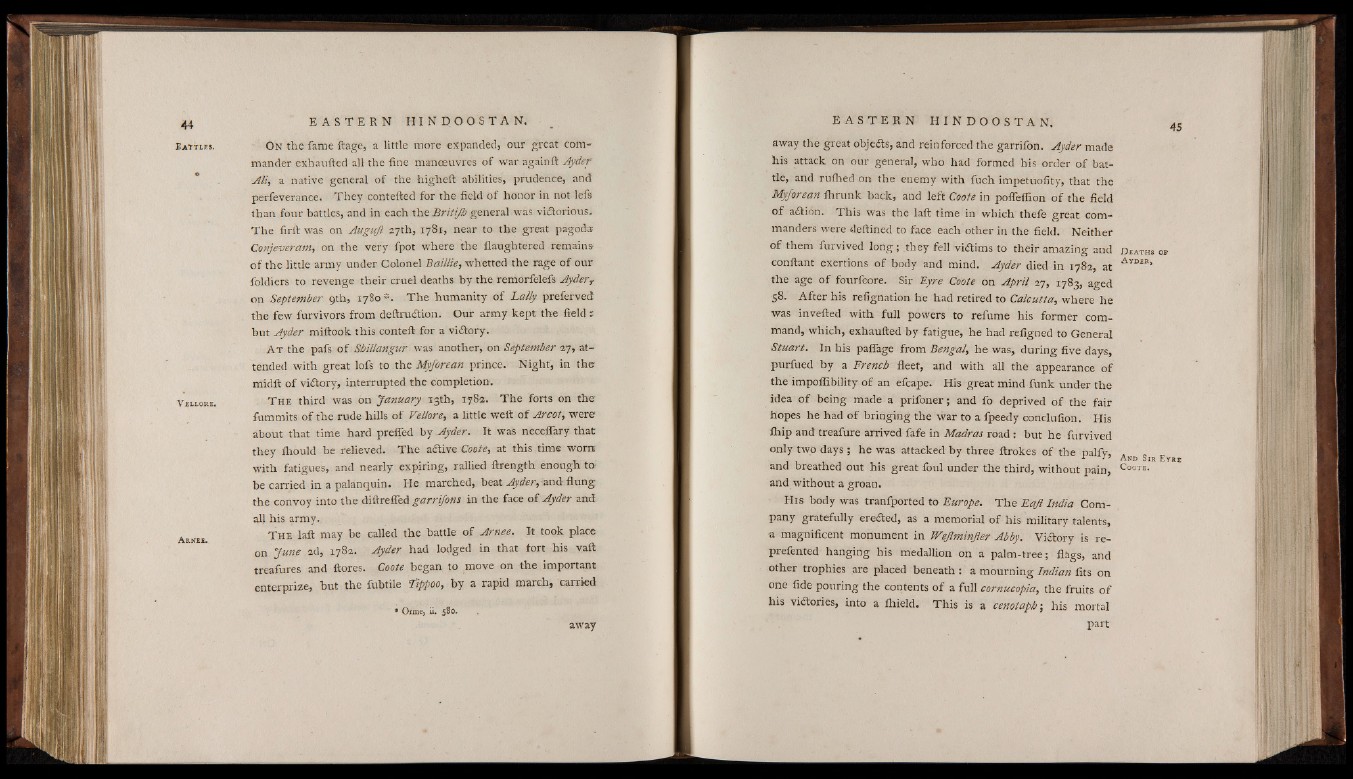
B a t t l e s .
V e l l o r e .
On the fame ftage, a little more expanded, our great commander
exhaufted all the fine manoeuvres of war againft Ayder
Ali, a native general of the higheft abilities, prudence, and
perfeverance. They contefted for the field of honor in not lefs
than four battles, and in each the Britijb general was victorious.
The firft was on Augujl 27th, 1781, near to the great pagoda;
Conjeveram, on the very fpot where the flaughtered remains'
of the little army under Colonel Baillie, whetted the rage o f our
foldiers to revenge their cruel deaths by the remorfelefs Ayder,
on September 9th, 1780*. The humanity of Lally preferved
the few furvivors from deftruition. Our army kept the field ;
but Ayder miftook this conteft for a victory.
A t the pafs o f Shillangur was another, on September 27, attended
with great lofs to the Myjorean prince. Night, in the
midit o f victory, interrupted the completion.
T he third was on January 13th, 1782. The forts on the
fummits of the rude hills of Vellore, a little weft of Arcot, were
about that time hard prefied by Ayder. It was necefiary that
they ihould be relieved. The aCtive Coote, at this time worn
with fatigues, and nearly expiring, rallied ftrength enough to
be carried in a palanquin. He marched, beat Ayder, and flung
the convoy into the diftrefled garrifons in the face of Ayder and
al} his army.
T he laft may be called the battle o f Arnee. It took place
on June 2d, 1782. Ayder had lodged in that fort his vaft
treafures and ftores. Coote began to move on the important
enterprize, but the fubtile ‘fippoo, by a rapid march, carried
1 Orme, ii. 580,
away
away the great objeCts, and reinforced the garrifon. Ayder made
his attack on our general, who had formed his order o f battle,
and ruihed on the enemy with fuch impetuofity, that the
Myjorean ihrunk back, and left Coote in pofleffion o f the field
o f aCtion. This was the laft time in which thefe great commanders
were deftined to face each other in the field. Neither
of them furvived long; they fell viaims to their amazing and Deaths of
conftant exertions of body and mind. Ayder died in 1782, at AyD£E>
the age of fourfcore. Sir Byre Coote on April 27, 1783, aged
58. After his refignation he had retired to Calcutta, where he
was invefted with full powers to refume his former command,
which, exhaufted by fatigue, he had refigned to General
Stuart. In his paflage from Bengal, he was, during five days,
purfued by a French fleer, and with all the appearance of
the impoffibility of an efcape. His great mind funk under the
idea o f being made a prifoner; and fo deprived o f the fair
hopes he had of bringing the war to a fpeedy conclufion. His
fhip and treafure arrived fafe in Madras road : but he furvived
only two days ; he was attacked by three ftrokes of the palfv, , „ -
, . r 77 A n d S i r E y r e
and breathed out his great foul under the third, without pain, CoOTEand
without a groan.
His body was tranfported to Europe. The Eaji India Company
gratefully ereCted, as a memorial of his military talents,
a magnificent monument in Wejlminjler Abby. Viaory is re-
prefented hanging his medallion on a palm-tree; flags, and
other trophies are placed beneath : a mourning Indian fits on
one fide pouring the contents o f a full cornucopia, the fruits o f
his viaories, into a Ihield. This is a cenotaph-, his mortal
part